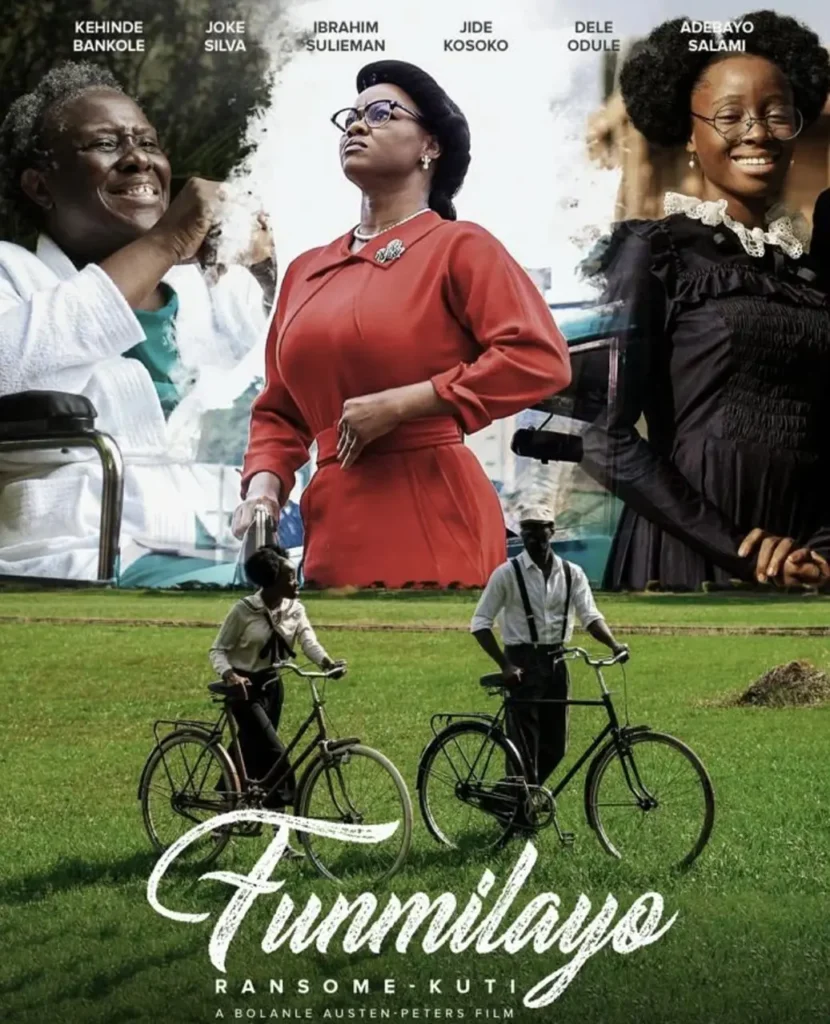Funmilayo Ransome-Kuti is a 2024 biopic film inspired by true events that unfolded in Abeokuta from 1900 to 1955. It portrays the life of Funmilayo Ransome-Kuti, an educator, activist, and the mother of Afrobeat legend Fela Kuti. The film sheds light on the lesser-known 1947 women’s uprising led by Funmilayo Ransome-Kuti and Eniola Soyinka (Wole Soyinka’s mother) through the Abeokuta Women’s Union. Their efforts were aimed at protesting high taxes and challenging gender inequality. Produced by Bolanle Austen-Peters in collaboration with Terra Kulture Arts & Studios, the film captures a pivotal chapter in Nigerian history.
Plot
Olufunmilayo Ransome-Kuti, wife of Rt. Rev. Israel Ransome-Kuti, mother of Dolupo, Olikoye, Fela, and Bekolari, was a prominent political campaigner, women’s rights activist, and humanitarian.
The film begins with a harrowing depiction of police brutality against the people, particularly targeting Funmilayo, who was reportedly thrown from a two-storey building while they forcefully sought information about Fela’s whereabouts.
In the subsequent scene, she is shown in a hospital being interviewed by Isabelle Jira, a reporter from Reuters News.
The narrative shifts between the 1900s and the present day. Olufunmilayo Ransome-Kuti reflects on her upbringing, influenced heavily by her father who introduced her to politics and instilled in her a love for history, which she greatly admired.
Despite expectations for her to follow her mother’s path and apprentice as a seamstress the following year, her father encouraged her to attend secondary school instead. She became the first female student at Abeokuta Grammar School, though this was met with resistance from male peers. During a confrontation where boys attempted to bully her into a well, Israel Ransome-Kuti, the head boy, intervened, sparking the beginning of their love story.
Years later, after Olufunmilayo returned home from England where she furthered her studies, her relationship with Israel resumed. Despite Israel being the son of a clergyman with beliefs differing from Olufunmilayo’s, they married.

Olufunmilayo established a preschool, an initiative encouraging illiterate parents to educate their children. One day, when the son of a market woman failed to attend school, Concerned, she went to the market to inquire about the child’s absence. While there, armed men known as Parakoyi arrived and began to destroy everything. In a bold move, Olufunmilayo confronted the gang leader, slapped him, and demanded the return of their goods. This was an event that would significantly alter the course of her life.
Olufunmilayo went to meet the District Officer, Mr Dundee, to report how the taxation imposed by the Egba Local Authority was adversely affecting the Egba women. However, the Parakoyi operated under the authority of the Alake, the King of Egba, rendering Mr. Dundee’s assistance minimal. This situation led Olufunmilayo to establish the Abeokuta Women’s Club.
In response, the Alake raised taxes and increased threats. Initially, the Abeokuta Women’s Club consisted of elite women, which did not adequately address the concerns of the market women. Consequently, after much reluctance, the broader Abeokuta Women’s Union was formed to represent better and incorporate women of different societal identities.
The king and his court were immovable, necessitating decisive action. The women marched to the palace and established a camp, maintaining their presence day and night. Their extraordinary resilience garnered widespread coverage in newspapers throughout Lagos and the nation.
Consequently, Mr. Dundee dispatched a representative to request that Alake revoke the 10% tax increase. However, the women remained resolute, demanding that all their grievances be addressed. Their steadfastness resulted in them being beaten by the Parakoyi and subsequently imprisoned.
Meanwhile, Israel Ransom-Kuti was simultaneously grappling with cancer, a circumstance unbeknownst to Funmilayo. Upon their release, despite sustaining injuries, they returned to the palace with fortified resolve. Funmilayo’s leadership in the protests continued to gain momentum, attracting participation from women in neighbouring villages and states.
As time elapsed, the resolve of the king and his court waned, while the steadfastness of the women endured. Ultimately, they succeeded in dethroning the Alake. However, this victory came at a significant cost to Funmilayo: the tragic loss of her husband.
Cast
The movie Funmilayo Ransome-Kuti portrays three generations of Funmilayo, with Iyimide Ayo-Olumoko playing her as a child, Kehinde Bankole portraying her as a young woman, and Joke Silva depicting her in her older years.
Kehinde Bankole particularly shines in her pivotal role, skillfully embodying the character. One notable detail was her nuanced depiction of Funmilayo’s voice becoming hoarse during protests, highlighting meticulous attention to authenticity. Her portrayal adeptly showcases Funmilayo’s evolution into the formidable “Lioness of Lisabi,” highlighting her burgeoning political activism and leadership.
Joke Silva, as the elder Funmilayo and the film’s narrator, delivers a poignant performance that resonates with wisdom and resilience, reflecting a lifetime of enduring hardships and achieving significant milestones.
Israel’s character is portrayed by Iremide Adeoye as a young man and Ibrahim Suleiman in his adult years until his passing. Despite limited screen time, Ibrahim Suleiman’s portrayal leaves a profound impact, portraying Israel as a pillar of strength crucial to Funmilayo’s journey and struggles.
The film boasts an outstanding ensemble cast including Patrick Dibuah, Jide Kosoko, Omowunmi Dada, Dele Odule, Adebayo Salami, Adunni Ade, Keppy Ekpeyoung, and Oga Bello, each adding depth and nuance to the narrative.
Language
Funmilayo Ransom-Kuti primarily unfolds in English with occasional dialogue in Yoruba reflecting the multicultural fabric of 1900 Nigeria. Yoruba was greatly expressed in Music and Proverbs.
Summary
In recent years, biographical films have found a special place in cinema, offering audiences a glimpse into the lives of remarkable individuals whose contributions have shaped history. Funmilayo Ransome-Kuti is one such film that dives deep into the extraordinary life of Nigeria’s iconic activist, capturing her indomitable spirit and unwavering commitment to justice and equality.
Visually, Funmilayo Ransome-Kuti is a feast for the eyes, with stunning cinematography that captures both the grandeur of Nigeria’s landscapes particularly Abeokuta and the intimacy of personal moments. The director’s careful attention to period detail—from costume design with the use of Adire for the protests to set decoration—immerses viewers in the historical context, enhancing the authenticity of the storytelling. The film’s soundtrack, featuring a blend of traditional Nigerian music and original compositions, complements the narrative arc, heightening emotional impact during pivotal scenes.
Moreover, the film delves into the personal sacrifices made by Funmilayo and her family, highlighting the toll of activism on relationships and mental health. This humanizing approach deepens our connection to the characters, fostering empathy and understanding of their motivations and struggles.
In conclusion, Funmilayo Ransome-Kuti’s pioneering achievements are vividly portrayed in the film, which effectively captures her enduring legacy.

Review Overview
Summary
Visually, Funmilayo Ransome-Kuti is a feast for the eyes, with stunning cinematography that captures both the grandeur of Nigeria’s landscapes particularly Abeokuta and the intimacy of personal moments. The director's careful attention to period detail—from costume design with the use of Adire for the protests to set decoration—immerses viewers in the historical context, enhancing the authenticity of the storytelling.
- Costumes8
- Casting7
- Plot8
- Setting8
- Story8














